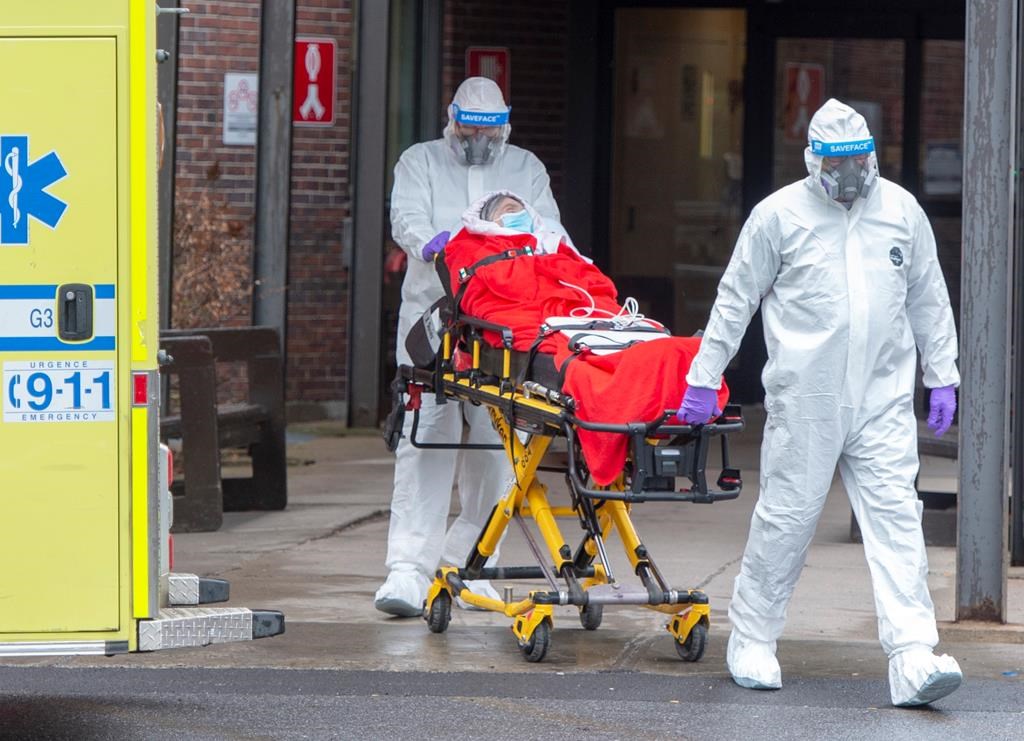A new report by Quebec’s national public health institute suggests the province has done a better job protecting long-term care centres from COVID-19 outbreaks during the second wave of the pandemic than it did in the spring.

Between Feb. 23 and July 11 — what the institute defines as the first wave of the pandemic — 14 per cent of the province’s long-term care centres had more than 50 COVID-19 cases per 100 beds. That dropped to two per cent between Aug. 23 and Nov. 21, what it defines as the second wave, which is ongoing.
The number of long-term care homes reporting a least one case also declined, from 39 per cent during the first wave, to 26 per cent during the second wave up until Nov. 21, the report said.
While the 40,000 residents of Quebec’s long-term care homes account for around half of one per cent of the province’s population, they’ve accounted for 64 per cent of the deaths attributed to COVID-19 in Quebec, according to the public health institute.
Nearly 4,000 people died from COVID-19-related causes in Quebec’s long-term care centres and private seniors residences during the first wave of the pandemic.
The report came as Quebec’s Health Department said Thursday there were more than 1,000 people in hospital with COVID-19 for the first time since June.
READ MORE: Quebec’s coronavirus hospitalizations soar past 1,000 as province reports 1,855 new cases

Get weekly health news
“Hospital numbers are undoubtedly increasing, there’s no question, we are no longer on a plateau,” Dr. Paul Warshawsky, chief of the intensive care unit at Montreal’s Jewish General Hospital, said in an interview Thursday. “We know that that’s going to soon turn into an increased demand for ICU beds and those beds are not as readily available as we’d like them to be.”
During the first wave of the pandemic, Warshawsky said, the number of non-COVID patients in the ICU was lower than usual. Now, things have returned to normal and hospitals generally see more trauma cases and respiratory illnesses in winter, he said.
“That’s what scares me,” Warshawsky said. “I was able to make 30 beds available to critically ill COVID patients for the first wave. It’s going to be very challenging to make 30 beds available to critically ill COVID patients during the second wave. I’m not even sure it will be possible.”
The province’s Health Department reported 1,002 hospitalizations on Thursday, an increase of 27 from the previous day. The number of people in intensive care rose to 134, an increase of six. Quebec reported 1,855 new cases of COVID-19 and 22 more deaths linked to the novel coronavirus.
For the past two weeks, Quebec has reported around 1,500 new cases of COVID-19 a day, said Roxane Borges Da Silva, a professor at the Universite de Montreal’s school of public health. She said to expect the number of hospitalizations — and deaths — to continue rising.
While Quebec has announced plans to shut retail stores that sell non-essential goods from Dec. 25 to Jan. 11 and extend the winter break for schools, Borges Da Silva said she doesn’t understand why the government is waiting that long.
READ MORE: Quebec MNA out of CAQ caucus after flouting coronavirus rules
She said she also doesn’t understand why manufacturing facilities, which have more outbreaks and more cases than other type of workplace, aren’t being forced to close. “Thirty one per cent of outbreaks in workplaces are in the manufacturing industry,” she said in an interview Thursday. “And 18 per cent in retail stores.”
The Health Department said it planned to have another 21 COVID-19 vaccination sites operational across the province next week. But Warshawsky said the vaccine won’t make a difference for some time.
“We have a vaccine and that’s great and that’s a huge accomplishment, no doubt. But, realistically speaking, that’s not going to have any impact at all on hospital numbers for at least two months, more likely three,” he said.
While the first wave of the pandemic in Quebec was mostly confined to long-term care facilities, he said, it’s now more present in the community.
Quebec began vaccinating residents of two long-term care centres, in Montreal and Quebec City, on Monday. More than half of the new vaccination sites are at long-term care facilities.
The Health Department said 969 people in Quebec were vaccinated against the novel coronavirus Wednesday, bringing the total to 2,582 people since Monday. It expects 4,875 doses will have been administered by the end of this week.
Quebec has reported 171,028 confirmed cases of COVID-19 and 7,635 deaths linked to the virus since the beginning of the pandemic.







Comments